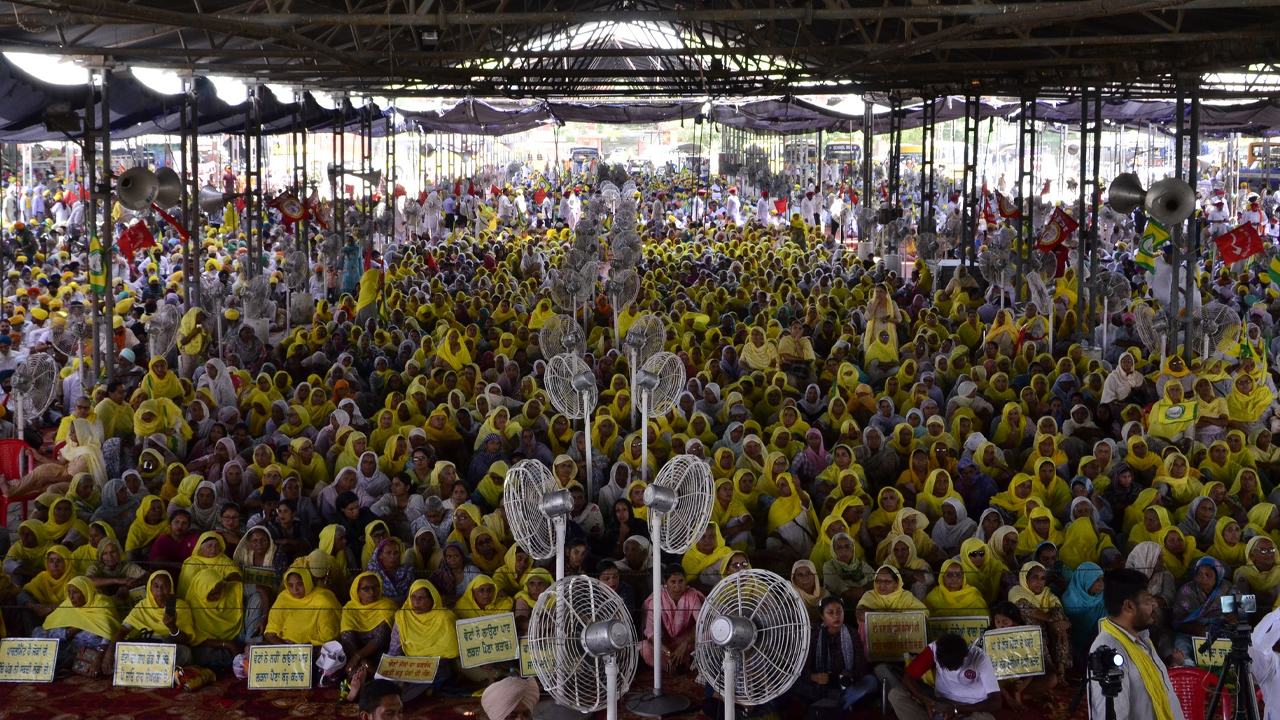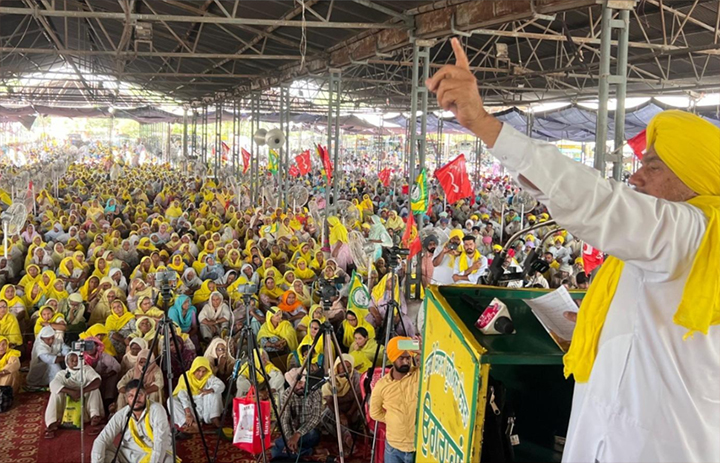Perhaps, nowhere in the country during the last two months of electioneering did any people’s gathering has manifested mass democratic consciousness and determination to transform the current repressive socio-economic order in such clear political terms.
By Harsh Thakor
On 26 May, over 20,000 people of Punjab converged at the Barnala grain market for the Lok Sangram rally. While people in large numbers from across the state gathered at the rally called by BKU Ugrahan, most of them came from Barnala Sangrur, Patiala, Mansa, Bathinda and Ludhiana, the nearby districts. Around 24 organisations, encompassing peasants, agricultural labourers, industrial workers, students, govt. employees, unemployed teachers and women participated in the program.
The Lok Sangram Rally gave an effective jolt to the ruling AAP as well as the Congress and the BJP campaigning to get their candidates elected for the Lok Sabha from Punjab. The scenario at the Barnala grain market on the day was one with thousands of peasants, workers and youth teeming with democratic revolutionary consciousness and voicing the real demands of the masses of Punjab. While the mainstream media reported the rally as one of the many other events during the run-up to polling in the state on 1st June, the truth is that perhaps nowhere in the country during the last two months of electioneering did any people’s gathering has manifested mass democratic consciousness and determination to transform the current repressive socio-economic order in such clear political terms. No gathering gave such a call to people building their own struggles and rejecting ruling class politics.
The principal organiser of the rally was the BKU Ugrahan, the state’s largest farmer union, while other organisations comprised the Punjab Khet Mazdoor Union, Democratic Teachers Front (DTF), Punjab Students Union (Randhawa), Powercom and Transco Contract Employees Union, Water and Sanitation Contract Employees Union, Forest Mazdoor Union, the Bhakra Beas Management Board Workers Union, etc.
The rally was called during the elections to tell the people not to harbour any aspirations from the mainstream political parties and relentlessly trod the path of struggle to achieve their demands and goals. The organisers stressed that political parties be it the BJP, Congress, Shiromani Akali Dal, Aam Aadmi party, they all can stoop to any depth to win power and despite different names, their agenda is akin and they all dance to the very tune of the ruling classes.
The organisers didn’t ask people to vote for or defeat any political party in the General Election. The organisers published and projected at the rally a 30-point agenda, the main points of which are to abolish outsourcing in government offices, kick out all the corporates and MNCs, employment for all, revival of the old pension scheme in place of the new one, scrap the 2020 electricity amendment Bill, legal guarantees minimum support prices for all foodgrains, India’s withdrawal from the World Trade Organisation (WTO), adoption of policies that favour farmers and labourers, scrapping of 2020 National Education Policy, work throughout the year for agricultural labourers as well as construction workers, 8 hour work-day for all categories of workers, abolition of contract labour system, abolition of private money lenders, implementation of demands of MGNREGA workers, scrapping or NPR/NRC, proper subsidies for education, health, electricity etc., abolish sale of drugs in Punjab, and release of all political prisoners framed under false charges. These demands raised before thousands of people comprise the politics of a model to construct a genuinely democratic political and social order. The speakers laid bare why the aspiration of any genuine democracy in the current electoral system is utopian and how the interests of the parties seeking people’s mandate are tied to global imperialism, domestic capitalist classes and feudalism.
What demarcated this rally from others in the democratic camp is that it refrained from issuing a call for ‘boycott’ of elections or supporting any candidates or opposition parties or alliances. This seems to be the most appropriate approach, with the broad masses still not acquiring revolutionary consciousness to imbibe politics of ‘boycott of election’ and establish alternative organs of people’s power. The ‘boycott’ slogan of certain revolutionary sections has drawn away the masses in the past, while supporting candidates or participating has nullified mass struggles and diffused revolutionary consciousness.
The revolutionary platform Lok Morcha undertook a campaign traversing village to village inviting people to project a revolutionary alternative as part of a month-long campaign during the elections in Punjab. Till 16th May, a total of 42 meetings were held in 34 villages, 5 blocks and 3 districts. These meetings were held in Bathinda, Barnala, Muktsar, Malerkotla, Sangrur, Patiala and Ludhiana. Farmers, farm workers, factory workers, contract employees, teachers, thermal plant workers, electricity workers, milk plant workers, students, youth, retired workers have been participating in these meetings.
In these gatherings, the organisers propagated that elections were a camouflage of false democracy and a means to divide people and divert attention from the real issues. The speakers projected that the root causes of the plight of the people – arbitrary distribution of land and imperialist plunder – is not on the agenda of any vote-seeking party. It professed that people should not repose faith in elections, and should march in the direction of building a revolutionary alternative.
In contrast, organisations like Lok Sangram Manch backing Maoist trend subscribed to a line of active boycott of elections, and in many villages in regions like Sangrur held torch rallies. Inquilabi Kendra, another radical left outfit, gave a call to vote for NOTA. CPI(ML) New Democracy and Zameen Prapt Sangharsh Committee, both issued calls for defeating BJP.
A major focus of the Lok Sangram Rally in Barnala was on the theme that it is not just the BJP-party but the very repressive or autocratic nature of the ruling class parliamentary politics that bed fascism. Speakers summarised that fascism was an overall attack of the ruling classes even if the BJP was playing a leading role. Unlike many other contingents of the democratic revolutionary camp, it did not give a call for defeating BJP-RSS or supporting INDIA block, but in no uncertain terms condemned the agenda and policies of the Hindutva fascist BJP, touched diversionary issues like building Ram Mandir or fascist laws like NPR, NRC etc. In contrast Samyukt Kisan Morcha directly called people to defeat BJP and Modi in their protest rallies and campaign materials.
The meeting started in the Barnal grain market after paying homage to the recently deceased poet Surjit Pattar, whose writings were instrumental in sowing the seeds for the revolutionary movement among the people.
BKU (Ugrahan) leader Jhanda Singh Jethuke, while addressing the gathering stressed in detail the nefarious games played by ruling class parties to divert people from their burning issues and explained the basic futility of the parliamentary democratic system. In his speech he illustrated how parliamentary institutions were organs of the ruling classes and not true democratic institutions and how the parliament serves democracy of the oppressor classes. Jethuke laid stress on the unity of all the oppressed classes, be it workers, farmers or landless labourers, and portrayed how the ruling classes left no stones unturned in breaking their unity on communal and divisive lines. His speech effectively conveyed how in actual reality electoral democracy was a farce without any power to the workers or peasants.
In the concluding speech BKU president, Joginder Singh Ugrahan narrated how the ruling class parties had negated the 30-point agenda and tricked the people that they will fulfil their aspirations. He told people not to repose any faith in any of the political parties. Ugrahan summarised why parliamentary elections led people to diversionary paths and crushed mass struggles. He said that BKU-Ugrahan became powerful and played a positive role only because it rejected parliamentary politics. He recounted how the 1956 militant PEPSU farmers movement led by CPI capitulated because of towing the parliamentary path.
“After every five years, people elect governments at the Centre and in states. But do these governments fulfill the demands of the masses? For that one has to struggle. So we always are in the path of struggle,” stated Sukhdev Singh Kokrikalan, general secretary of the Bharatiya Kisan Union Ugrahan.
BKU (Ugrahan) women’s wing leader stated how women were targeted by social fascism and how the social system subjected them to social bondage. She glorified the heroic resistance of women in the recent farmer’s movement and how women could be as potent a democratic force as men.
Speaker from Punjabi journal Surk Leeh summarized how fascist tendencies of the Indian ruling classes are not limited to any one party and how more or less all the ruling class parties do not hesitate to use fascist methods during their rule. It explained how they were in the past pressing for the same economic reforms for which the BJP is now resorting to communal fascist tactics. It wrote about how certain sections of the left have mistakenly adopted the parliamentary election as an important weapon to repeal the fascist attack of the BJP which is not the correct approach in the present circumstances.
A significant thing was the participation of trade union leaders representing the urban factory workers and rural agricultural labourers in the rally. Various aspects of worker-peasant unity were highlighted, which is vital to construct a mass revolutionary movement. The worker Union leaders, addressing the people, explained how workers were alienated as never before by the economic policies.
Digvijay Pal Sharma, state president of a DTF faction said, “I got recruited in the education department in 2005 under the new pension scheme, and for years we have been struggling to get the old pension scheme reintroduced. Four Lok Sabha and Assembly polls have taken place since then but our demand hasn’t been fulfilled. So what are we expecting from these leaders and the governments? Once in power, they are pro-corporate and never take decisions for people’s welfare.”
Lachhman Singh Sewewala, general secretary of the Punjab Khet Mazdoor Union raised how the parties had violated promises made to MGNREGA workers, how no regular work was given to agricultural labourers nor are they paid minimum wages as was promised. He demanded proper housing for the rural poor and distribution of 1/3rd panchayat common land to the landless dalit peasants.
Hoshiyar Salemgarh, leader of the Punjab Students Union (Shaheed Randhawa) explained how the new education policy introduced by the Modi government has ostracised the student community, literally selling education to the corporates.
Harsh Thakor is a freelance journalist who attended the Lok Sangram election rally in Barnala on May 26th. He is thankful to Pavel Kussa, editor of Surk Leeh, for providing inputs for this report.


